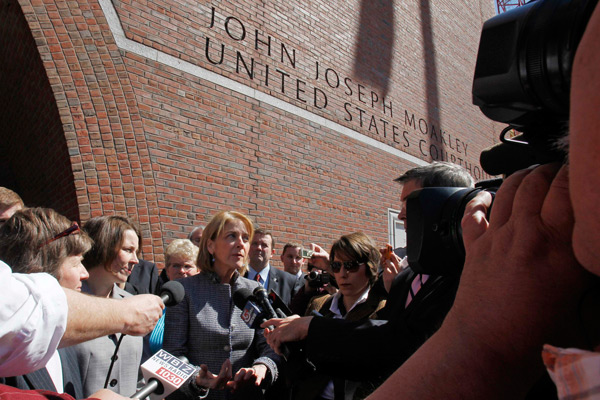
BOSTON (CNS) — With a ruling that acknowledged the final decision will be up to the Supreme Court, a federal appeals court declared the Defense of Marriage Act unconstitutional May 31.
The 1st U.S. Circuit Court of Appeals overturned the provision of the 1996 federal law, known as DOMA, that defines marriage as “a legal union between one man and one woman as husband and wife.”
The three-judge panel cited previous Supreme Court rulings that struck down laws determined to be discriminatory against a class of people as being among the keys to their ruling.
The case was brought against the federal government by a group of same-sex married couples and several widowed spouses, all from Massachusetts. They seek access to federal benefits such as Social Security that would be available to heterosexual married couples but are blocked under DOMA.
The law was passed soon after Hawaii’s Supreme Court held that it might violate the state constitution to deny marriage to same-sex couples. Amid concern that states would soon begin to allow same-sex marriages, Congress passed and President Bill Clinton signed the 230-word law, which the appeals court described as “one of the shortest major enactments in recent history.”
Since then, 30 states have passed constitutional prohibitions on same-sex marriage while six states and the District of Columbia have passed laws permitting it. Another dozen states, including Hawaii, have laws recognizing civil unions between people of the same sex.
The 1st Circuit was reviewing only the provision of DOMA that defines “marriage” and “spouse,” not its provision guaranteeing that no state or territory is required to recognize a marriage recognized by another state or territory.
The court said the case was difficult, “because it couples issues of equal protection and federalism with the need to assess the rationale for a congressional statute.”
That rationale is “open to interpretation,” the judges said, adding: “We have done our best to discern the direction of these precedents, but only the Supreme Court can finally decide this unique case.”
In summarizing some of its conclusions, the court noted: “Many Americans believe that marriage is the union of a man and a woman, and most Americans live in states where that is the law today.
“One virtue of federalism is that it permits this diversity of governance based on local choice, but this applies as well to the states that have chosen to legalize same-sex marriage. Under current Supreme Court authority, Congress’s denial of federal benefits to same-sex couples lawfully married in Massachusetts has not been adequately supported by any permissible federal interest.”
The ruling noted that under DOMA, federal funding to Massachusetts could be revoked for programs tied to the law’s definition of marriage, such as Medicare and Medicaid or burial in a veterans’ cemetery as a spouse.
“By combining the income of individuals in same-sex marriages, Massachusetts’ Medicaid program is noncompliant with DOMA, and the Department of Health and Human Services, through its Centers for Medicare and Medicaid Services, has discretion to rescind Medicaid funding to noncomplying states,” the judges said. “Burying a veteran with his or her same-sex spouse removes federal ‘veterans’ cemetery’; status and gives the Department of Veterans’ Affairs discretion to recapture all federal funding for the cemetery.”
Among the organizations that urged the court to uphold DOMA were the Massachusetts Catholic Conference, the U.S. Conference of Catholic Bishops, and other Christian and Jewish religious groups.
They filed a friend-of-the-court brief saying that “social science, common sense and the vast experience (of the organizations) in family matters support Congress’s conclusion that marriage, defined as the union of one man and one woman, is closely tied to the welfare of children, the well-being of the family and the health of the nation.”
“Our understanding is based not only on the teachings of our respective faith traditions, but on carefully reasoned judgments about the nature and needs of individuals (especially children) and society, and on literally millions of hours of counseling and ministry,” they said.






